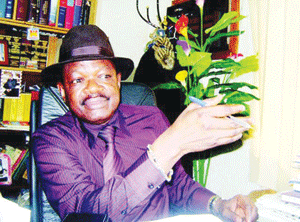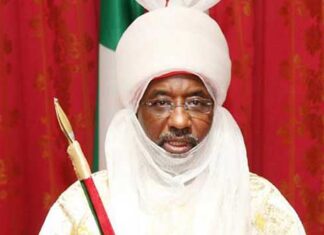Fred Agbaje, an astute lawyer with 30 years post-call experience, in this interview with Senior Correspondent, ONYEWUCHI OJINNAKA, speaks on the Confab report, the need to amend the 1999 Constitution and capital punishment for graft, among other issues.
President Muhammadu Buhari is yet to appoint the Minister of Justice five months after inauguration. How do you feel?
Left for me, I will not blame Mr. President; rather the constitution of the country. Constitution is the fundamental law that governs all the institutions in the country, including the office of the president. It is the law that sets out how administration of the state called Nigeria should be run. It is not stated in the constitution that the president must constitute his cabinet on May 29. That is the loophole. Whatever happens why the president could not have named his cabinet should be blamed on the weak constitution that has created numerous avenues for the political leaders to manipulate. If the constitution states clearly that one week after inauguration, the president and the state governors must constitute their cabinets and stringent conditions provided for those who fail to do so, everybody will sit tight.
For instance, Osun State Governor, Rauf Aregbesola, did not constitute his cabinet until almost a year after he was sworn in. But if the constitution is amended and it is stated that a week after inauguration, the cabinet must be constituted and be in place, and that failure to do so will amount to violation of the constitution and such executive member can be impeached, the executive members will sit up.
The reason for saying this is that governance is meant for those who are serious, and before taking the oath of office as president or a state governor, it is presumed that a serious politician should have done necessary things because he is aware that there are numerous problems of Nigeria that needed to be solved. He ought to have gotten honest Nigerians to put in the cabinet (before he was sworn in). There is no need to wait until after inauguration before looking for the people to constitute the cabinet. It is a sign of unseriousness and a calamitous approach to governance.
While campaigning, the research ought to have been done on how to constitute the cabinet, and if Plan ‘A’ fails, Plan ‘B’ would replace it. But what has happened to the president is because he put all his eggs in one basket by relying on certain people who were former ministers or governors or people very close to him, oblivious that such people have skeletons in their cupboards. When the exposure came, he was shocked because he has no Plan ‘B’. If he has alternative plan, he would not have been in the present situation. There is no doubt the president is a gentleman with zero tolerance for corruption and he has been able to use his charismatic approach to tackle corruption. The mention of Buhari is enough to let things take shape; for instance, the issue of electricity supply, which had been epileptic, has improved, though not 100 per cent.
I feel the National Assembly that is supposed to be the collaborative organ in the passage of law to give direction to Mr. President do not even sit. Only two arms of government are working: the judiciary and the executives. The present National Assembly members are selfish and not reliable, but more interested in personal aggrandisement. If the president wants to succeed in the next four years, he should be careful with the present National Assembly. This is the third month they have been sitting and how many bills have they passed into law or considered. I think Mr. President should begin to be careful.
In a bid to amend the constitution, should the president rely on the report of the National Conference?
In the first instance, I am not comfortable with the set-up of the Confab in the first place and the outcome. I want to believe that some honourable Nigerians were railroaded into the conference because they ought to have known that there is no way the government that has less than five months to vacate the seat would be able to implement the report of the National Conference they were invited to participate in. We all know that one of the major philosophies of law is jurisprudence. No government can buy its successor, and if such cannot happen, the members of the conference, particularly lawyers, should have asked themselves, how do we expect incoming government after Jonathan to implement the report? Would they not say they are not party to the confab? Would they not say that the outcome of the conference was not part of their manifesto? These are the fundamental questions the participants ought to have asked themselves. But because of what to eat, 70 and 80 years old men clamoured to become members of the conference. What is the essence of the National Conference if the government that constituted it could not implement the report? How do they expect the incumbent government to inherit another man’s liability? I am not holding brief for the president, but I am just wondering how he would juxtapose the outcome of the conference with his political manifesto, no matter how laudable they are.
One hundred days in office suddenly became an issue when the political rival said the president has not achieved anything. But he replied that he did not promise to turn Nigeria to heaven within 100 days. If he decides to implement the report of the Confab, are they not going to say that he did not mention such in his manifesto? I do not blame the president if he distances himself from the report of the Confab because he was not part of the conjugal rites that gave birth to it. How do we expect him to inherit a bastard?
The whistle blowers’ bill has not been passed into law. If the bill is passed, is it capable of assisting in the war against corruption?
For effective fight against corruption, we need to make Freedom of Information (FoI) law, which is already in force, available in all the states of the federation. All the states must adopt it, instead of leaving it at the federal level. I can remember that some human rights organisation early this year asked the immediate past government of Lagos State to render account on certain expenditures. Babatunde Fashola’s regime refused to oblige the organisations, and they went to court, and they defended themselves. In other words, we need effective implementation of the FoI Act. Another issue is the amendment of the constitution, especially Section 15 which deals with all organs of government to join hands to fight corruption and Section 36 dealing with fair hearing should be amended. Cases related to graft, presumption of innocence should not apply because a Grade Level 17 official who has several houses, fleet of cars and all his children went to school abroad should defend himself or proof his innocence.
Another issue is to amend the Administration of Criminal Justice system in the states. Where they operate criminal code, it should be amended as well, to renew the mentality of incorporating anti-graft law. The constitution should stipulate it that any graft offence is a capital offence through which the presiding judge will grant bail only on health grounds from renowned public hospitals. I am an insider and I have been defending criminals; I know some past governors who have allowed anti-graft cases to hang on their neck and they are now either senators; meanwhile, their cases had been on for more than six to seven years. In other words, the society has recycled them to become lawmakers instead of being in prison.
To make the graft more socially-oriented, we must amend the administration of criminal justice law, the evidence law, Section 36 of the constitution, particularly making graft offences capital. Declaration of asset is a mere cosmetic approach of fighting corruption and it is not fundamental.
The fight against corruption should start from the state governors and be extended to the civil service and the legislature. The present National Assembly consists of some state governors who had stolen money. They cannot make good law when they know that arraignment is hanging on their neck and they would be the first victims. Nigeria is at the crossroads to fight corruption because those who are supposed to give direction to Mr. President’s approach to fight corruption will not do it.
The state governors who are eyeing the Senate seats will never support any move to amend the constitution to make graft offenders suffer life imprisonment because some of them know they will soon be arraigned. Those who think the condition is so stringent should also realise that corruption has deprived Nigeria of development. Corruption is the root of unemployment and insecurity we are witnessing in the country today. We need to address corruption seriously and fundamentally through the instrumentality of law and constitution. Government must be serious with the institutions that are fighting corruption, instead of celebrating individuals, so that when the incumbent president finishes his regime, the institutions will continue in the fight against corruption.













